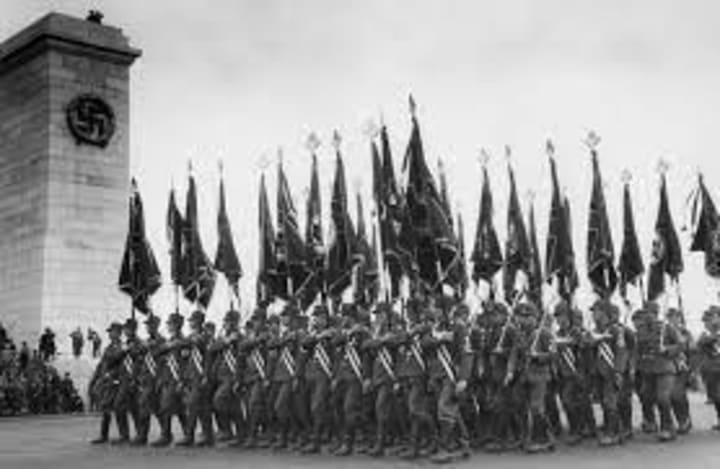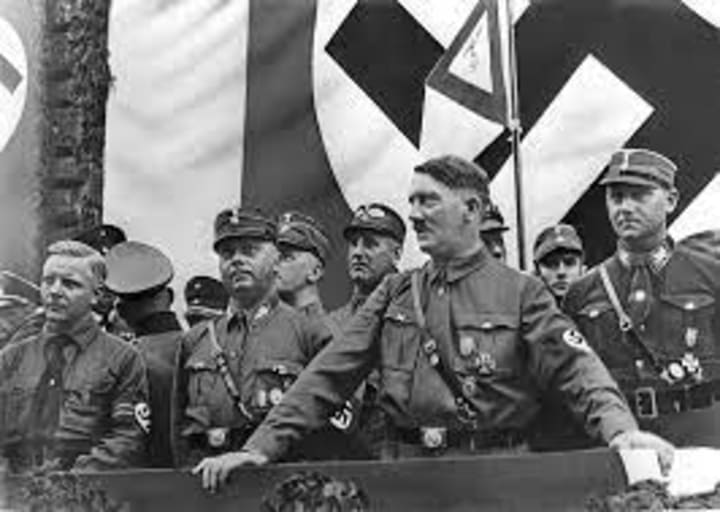Understanding the Complex Motivations Behind Hitler and the Rise of Nazism
The rise of Nazism and the atrocities committed during World War II under the leadership of Adolf Hitler continue to be a dark chapter in human history. In this article, we will delve into the complex motivations behind Hitler and the rise of Nazism. We will explore the historical, political, economic, and social factors that led to the Nazi party's ascension to power, as well as the ideology and leadership style of Adolf Hitler.

The rise of Nazism and the atrocities committed during World War II under the leadership of Adolf Hitler continue to be a dark chapter in human history. The question of how such evil could gain a foothold in a modern, civilized society remains a topic of much debate and study. In this article, we will delve into the complex motivations behind Hitler and the rise of Nazism. We will explore the historical, political, economic, and social factors that led to the Nazi party's ascension to power, as well as the ideology and leadership style of Adolf Hitler. Additionally, we will examine the devastating impact that Nazism had on millions of people, including the Holocaust, and the legacy that it has left behind.
Early Life and Political Views of Adolf Hitler

Hitler's Childhood and Youth
Adolf Hitler was born in Austria in 1889 and had a troubled childhood. His father was abusive and he struggled in school. After his father's death, Hitler moved to Vienna and failed to secure a place in art school. He spent many years living in poverty, often homeless. It is believed that his experiences during this time shaped his extreme views and his desire for power.
Hitler's Early Political Views and Activism
Hitler became interested in politics during his time in Vienna and developed a strong anti-Semitic and anti-Marxist ideology. In 1919, he joined the German Workers' Party, which later became the Nazi Party. Hitler quickly rose through the ranks and became the party's leader in 1921. He used propaganda and violence to promote his message and gain support.
Hitler's Imprisonment and Mein Kampf
In 1923, Hitler attempted to seize power in Munich but was arrested and imprisoned. While in jail, he wrote Mein Kampf, which outlined his political views and the ideology of National Socialism. The book became a bestseller and helped to spread his message across Germany. After his release, Hitler continued to build the Nazi Party and eventually became Chancellor in 1933.
The Impact of World War I on Germany and its People

The Treaty of Versailles and its Consequences
Germany's defeat in World War I had a profound impact on the country and its people. The Treaty of Versailles, signed in 1919, imposed harsh reparations on Germany and forced the country to accept full responsibility for the war. This contributed to a sense of national humiliation and resentment among many Germans.
The Economic and Social Impact of the War
The war had also devastated Germany's economy and society. Hyperinflation and unemployment were rampant, and many Germans struggled to make ends meet. This led to social unrest and a desire for change.
The Rise of Extreme Nationalism and Anti-Semitism
In this context, extreme nationalism and anti-Semitism gained popularity. Many Germans believed that the Jews were responsible for their economic and social problems, and anti-Semitic propaganda became widespread. The Nazi Party capitalized on this sentiment and used it to promote their own message of hate and intolerance.
The Role of Propaganda in the Nazi Party's Rise to Power

Joseph Goebbels and the Nazi Propaganda Machine
Joseph Goebbels was the head of the Nazi Party's propaganda machine and used his skills as a master propagandist to great effect. He understood the power of media and used it to manipulate public opinion and create a cult of personality around Hitler.
The Use of Propaganda to Manipulate German Public Opinion
The Nazi Party used propaganda to create an image of Hitler as a strong and charismatic leader, and to demonize their opponents. They also used propaganda to spread their message of hate and intolerance, portraying Jews and other minorities as a threat to German society.
Propaganda as a Tool of Control in Nazi Germany
Propaganda was also used as a tool of control once the Nazis came to power. The party created a vast propaganda machine that controlled every aspect of public life. They used propaganda to shape public opinion, suppress dissent, and justify their brutal policies.
The Ideology of National Socialism and its Impact on German Society

National Socialism as a Political and Social Movement
National Socialism was a political and social movement that emphasized extreme nationalism, anti-Semitism, and racial superiority. It promoted the idea of a "pure Aryan race" and sought to create a totalitarian state.
The Role of Anti-Semitism and Racial Superiority in Nazi Ideology
Anti-Semitism and racial superiority were central to Nazi ideology. The party believed that Jews were responsible for a range of societal problems, and that Aryans were a superior race. They used these beliefs to justify their policies of discrimination and genocide.
The Nazi Vision of a "Pure Aryan Race" and its Implications
The Nazi vision of a "pure Aryan race" had devastating consequences for millions of people. The party believed in the superiority of the Aryan race and sought to eliminate anyone they deemed "impure." This led to the persecution and murder of millions of Jews, as well as other minorities, including homosexuals, disabled people, and Roma.Holocaust
The Nuremberg Trials and Accountability for War Crimes
The Formation of Israel and the Zionist Movement
The Importance of Remembering and Educating about the Holocaust
The Role of Economic and Social Factors in the Rise of Nazism
The Great Depression and the rise of unemployment played a significant role in the rise of Nazism in Germany. The economic turmoil of the 1930s led to massive unemployment and poverty, which left millions of Germans desperate for change. Many of these individuals turned to the Nazi party, which promised to revitalize the economy and provide jobs.
Additionally, the appeal of Nazism to the middle and working classes cannot be ignored. The party's focus on traditional values, including a strong work ethic, appealed to many Germans who felt that their way of life was under threat. The Nazi party also promised to protect the interests of small business owners, who were struggling to compete with larger corporations.
Finally, the Nazi party's welfare and employment policies were popular with many Germans. The party promised to provide support for those in need, including the elderly and disabled. They also emphasized the importance of a healthy population and implemented policies to improve public health.
Hitler's Leadership Style and its Influence on Nazi Germany
Hitler's charismatic leadership and propaganda skills played a significant role in the rise of Nazi Germany. He was able to communicate his vision for a strong and powerful Germany in a way that resonated with many Germans. His speeches and rallies were powerful tools for rallying support and promoting Nazi ideology.
The Führerprinzip, or the leadership principle, was also crucial in consolidating Hitler's power. This principle gave Hitler absolute power over the Nazi party and the German government, which allowed him to make decisions without consultation or opposition.
Finally, Hitler's military strategy and aggressive foreign policy ultimately led to the outbreak of World War II. His aggressive expansionist policies and belief in German superiority led to the invasion of Poland and the eventual declaration of war.
The Treatment of Minorities and the Holocaust in Nazi Germany
The persecution and dehumanization of minorities, including Jews, Romani, and LGBTQ+ communities, was a defining characteristic of Nazi Germany. Hitler's belief in racial superiority led to policies designed to isolate and eliminate these groups from German society. This included the implementation of ghettos, concentration camps, and eventually the Holocaust.
Life in concentration camps and ghettos was brutal and inhumane. Prisoners were subjected to forced labor, torture, and medical experiments. Conditions were crowded and unsanitary, leading to widespread disease and death.
The implementation of the "Final Solution" was the culmination of Nazi policies towards minority groups. This policy called for the extermination of all Jews, and it resulted in the deaths of millions of innocent people.
Legacy of Nazism and Lessons Learned from the Holocaust

The Nuremberg Trials were crucial in holding Nazi officials accountable for the atrocities committed during World War II. This established the principle of individual accountability for war crimes, which remains relevant today.
The formation of Israel and the Zionist movement also arose out of the Holocaust. This event highlighted the need for a Jewish homeland and led to international support for the establishment of Israel.
Finally, the importance of remembering and educating about the Holocaust cannot be overstated. This event serves as a cautionary tale about the dangers of fascism, racism, and hate. It is essential that we continue to learn from this history to prevent similar atrocities from occurring in the future. In conclusion, understanding the complex motivations behind Hitler and the rise of Nazism is crucial in preventing similar atrocities from occurring in the future. By learning from the atrocities committed during this dark period in history, we can work towards building a more just and equitable society. Let us never forget the victims of the Holocaust, and let us continue to fight against hatred, bigotry, and oppression in all its forms.
About the Creator
Krishna raj
"If your dreams don't scare you, they're too SMALL"






Comments
There are no comments for this story
Be the first to respond and start the conversation.